#locked tomb analysis
Text
Okay I am officially rereading Harrow for the second (coherent) time and thE. THE THE THE PART???? Where Jod is talking to Harrow about the genocide??

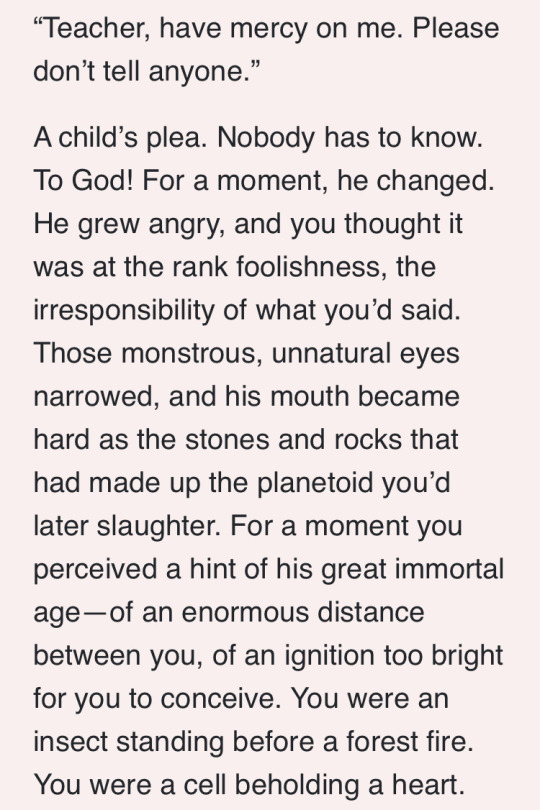

He’s like “hm yeah I did the same thing as your parents”
And harrow is like “me and my parents fucking suck”
And Jod is like “>:( no. No. Nobody should judge us you. Nobody has the right to know about this bad normal thing that is fine.”
And then he’s like “harrow is my special little guy now (we are both a million sins)”
92 notes
·
View notes
Text
What do we know about Anastasia’s timeline?
Anastasia’s bones were in the Locked Tomb.
Do we know when she died?
(side note before anyone decides to read this that this is 100% me speculating about probably very insignificant detail, based on very spurious evidence for anything, simply because I can’t quite get it out of my head.)
It seems improbable that she had someone else in the Ninth House place her bones there after her death, considering the whole “I pray the Tomb is shut forever” thing. Which means that she died in the Tomb. Either (a) after the initial imprisoning of Alecto she lived for a while running the Ninth House and then decided to go walk into the Tomb and curl up by the door to die, or (b) she died when the Tomb was initially closed.
(a) seems improbable because, while she of all people should have been able to bypass the wards and traps, she would still have needed a way to bypass John’s blood ward and kill someone for a burst of thanergy. Not impossible, but unlikely.
(b) is the likely scenario, but I’m sad about it, and I’m confused by the timeline. This is supported by Silas’ comment in Gideon:
“‘They had one job-- one rock to roll over one tomb; one act of guardianship, to live and die in a single blessedness-- and they made a cult instead.’“ (page 320 of Gideon)
The thing is, Anastasia had at least one child, because her bloodline has been unbroken for the last almost 10,000 years until Harrow’s birth. And Pyrrha talks about painting a nursery on the Ninth House. So either (a) the Ninth House was founded during the construction of the Tomb, and Anastasia had a child while the Tomb was being constructed (side tangent: who did Anastasia have a child with?) in which case Pyrrha’s nursery-painting would have taken place during the construction of the Tomb, (b) Anastasia already had a child before the construction of the Ninth House who took over running the Ninth House after her death and who Pyrrha/G1deon knew well enough to visit to decorate the nursery for their child, or (c) Anastasia already lived on the Ninth House before the original Lyctoring, and Pyrrha visited in her own body to help her paint a nursery.
As far as (b) goes, I want to think that if Anastasia had an adult child during the timeframe of the construction of the Tomb, we would have heard about them already. Maybe not, but it seems like Pyrrha at least would have mentioned them if she knew them well enough to pay them a visit to help paint their nursery.
(c) is plausible, but it feels a little bit unlikely. Mostly because of what we’ve heard about the original Lyctor process, that everyone arrived at Canaan House as a kind of pilgrimage (or were invited particularly, in Cytherea’s case) and studied there to develop the Lyctoral process. It doesn���t seem like the kind of thing where they were commuting back and forth between their home planets and Canaan House, or paying each other visits at their home planets. Additionally, the Ninth House was founded particularly to house and protect the Locked Tomb, so there doesn’t seem to be any reason that Anastasia would have been living there before anyone decided to build the Tomb in the first place.
So my current conception of Anastasia’s most likely timeline is:
The Resurrection
The original Lyctoral process - I think these might be as much as a generation after the Resurrection, because Augustine refers to Cytherea as being from the “second generation” of Lyctors at some point in Harrow but based on the notes and pictures from Canaan House it seems like everyone became a Lyctor more or less at once, or at least was working towards it simultaneously. The timeline of the original Lyctoring is something for another post.
The first attack by the Resurrection Beasts, followed shortly after by the decision to build the Tomb - this must take place only shortly after the original Lyctors were made, based on things that Teacher and John say in Harrow.
“’But when the work was done-- when I was finished, and so were they, and the new Lyctors found out the price-- they bade him kill the saltwater creature before she could do them harm...’” (Teacher, page 328 of Harrow)
“’She lived to see what happened at Canaan House. Not that she took much interest... And when the cost of Lyctorhood was paid, when the emotions were at their peak... we found out the price for our sin. The monstrous retribution. To be chased for our crime to the ends of the universe, to have our deed stain our very faces and follow after us like a foul smell. She died after that first terrible assault.’“ (John, page 346 of Harrow)
Anastasia moves to the Ninth House to begin construction of the Tomb?
Anastasia has a baby, possibly? G1deon, with Pyrrha in residence, visits to help her paint a nursery.
John Cask-of-Amontillado’s Alecto, putting her to sleep (as described in the poem at the start of Nona) and tying her up with chains. He closes the Tomb over her, seals all the wards, and leaves forever. Anastasia stays, to die in the Tomb.
But why would she stay? It wasn’t an issue of keeping Alecto in there while it was closed, because Alecto was asleep and chained up. Did they need a burst of thanergy to initially close the Tomb, as they do to open it? Or was it part of her vow to Alecto?
I expect a lot of these questions to be answered in Alecto, but Anastasia has been fascinating me since I finished Nona. I can’t wait to see her backstory explained, and I fully expect it to be absolutely heartbreaking.
#this is absolutely pointless; i just wanted to get some thoughts out#jester rambles#and boy is that tag ever accurate here#nona the ninth spoilers#locked tomb analysis#anastasia the first#alecto the first#harrow the ninth spoilers#the locked tomb predictions#locked tomb speculation#og lyctors
23 notes
·
View notes
Text
i love pre canaan house griddlehark. NO ONE is doing “enemies to lovers” like they are.they’re not “i love you but society said we’re enemies and i’m stuck not knowing if i should trust my heart or what i was taught all my life”, not “i love you but i don’t agree with what you stand for and I’m constantly having a moral crisis about it”, not “i love you but i was sent to kill you for the greater good and now i have to choose between you and the world” nonononono they are an “i hate you, i try to kill you again and again knowing i can’t. knowing if I’d succeed i’d kill myself next. knowing this is the only way we ever knew how to function in relation to each other and without it we are have nothing. knowing i’d rather have your knife to my throat than anyone else’s hand on my cheek”
rivolutionary, showstopping, awakened something in me. doomed me to read #enemiestolovers books in the hope i'd get even a gimpse of what gideon the ninth gave me
#tlt#gideon the ninth#griddlehark#the locked tomb#the locked tomb analysis#foggy thoughts#gideon nav#harrow nonagesimus
2K notes
·
View notes
Text
something i like about nona's family is that they're so like, almost a perfect little nuclear family, and then just. not.
like. pyrrha is "the person who works for her" but also the one who makes breakfast and does the dishes. she's a woman quite literally posessing the body of a cis man and really leaning into the look, honorarily trans in both directions, working construction and shaving in the mornings and braiding nona's hair before school.
and then there's camilla, her...nagging wife? troublemaking older child? roomate who she barely gets along with? the fact that palamedes shares this role is doubly weird. he's a man literally posessing the body of a cis woman, and they're both pyrrha's nagging wife/problem child/roomate. i don't personally believe that anything explicitly or overtly sexual was happening between her and either of them, but i completely understand where people who think that are coming from. and it's fucking weird (affetionate?).
even nona occupies a weird place in this dynamic. like. pyrrha is definitely a parent to her but camilla, who takes a much more active role in her daily life, is...idk. nona has a crush on her and wants to marry her and adopt dogs. camilla's feelings for nona are more parental or older-sisterly, in that she cares for her and wants to protect her, and if her feelings are more complicated than that, it's because of the obvious aspects of the situation which make her extremely sad and apprehensive of the future. her affection for nona seems relatively simple.
and then there's palamedes, who is in theory another parental figure (see: camilla's "i'll talk to your mother later" face, or pyrrha's "you're going to make someone a really irritating wife one day, sextus"), but in nona's view of things he seems like something more along the lines of an older sibling, or perhaps a cool uncle, which is funny because pyrrha arguably treats him more like a spouse than she does camilla.
it's all just so fucking weird and jumbled up on itself. pyrrha will kiss camilla on the head and say "i'll be home for dinner, dear," and then turn around and call both her and nona "daddy's own treasures" (don't get me started). she'll kiss palamedes and camilla both on the mouth and tell them she loves them. she'll tell them she didn't love them well, or even wholesomely, and she won't explain what she means by wholesome.
alecto calls her "mother and father." alecto tells her she should've given into her urges and eaten them.
palamedes and camilla are second cousins and queerplatonic and married and the same person and by the start of the book the lines between them are already dissolving.
nona is so so young and she's so so old and she's not so much younger than camilla and she's older than pyrrha can even comprehend and some days she needs help getting her shirt over her head.
and most importantly they all love each other. it's a weird and confused and unhealthy love. it's a love full of tension and annoyance and fear. it's a love that wants very badly to fit a category and can't. but it's love it's love it's love and even when it's over even when it has nowhere left to go it's not gone it can't be gone. it's over it's done you can't take loved away.
#i started out writing a very normal analysis of their dynamics and got increasingly emotional as it went on#but i kinda like the way it reads now so i'm not gonna edit for tone#enjoy watching me spiral in real time#nona the ninth#nona of new rho#the locked tomb#tlt#my post
2K notes
·
View notes
Text
paired with their often intimate and violent subject matter, i find the incidental way tamsyn muir frames women and their bodies throughout the locked tomb series to be refreshing bordering on radical
consider harrowhark; in the first book we see her as gideon sees her. she's a hideous ghoul with a flat ass and no tits, she's a delicate sopping wet beauty with a sharp face and angel bow lips, she's a triumphant and awe inspiring master necromancer screaming and fighting drenched in her own blood. the shape and condition of her body is allowed to take on meaning contextually based entirely on the situation and how gideon feels about their relationship in any given moment
she then spends the second book hobbling around with a sword twice her size, ripping apart her body to use as a weapon and passing out in her own vomit, struggling to eat and sleep – she and puts herself through absolute hell and never once thinks anything of it, and we're made to mourn this not as the desecration of a beautiful woman but as a manifestation of a human being's despair and self loathing, and we see this specifically contrasted against the care gideon tries to take when inhabiting her body during the last act
it's jarring, in nona, when we're suddenly made aware that her body could be perceived or valued as a commodity, when pyrrha is assumed to be nona's pimp. it feels strange and horrifying when we learn alecto's form was modeled for a doll, learn that she was given a woman's body as a display of ownership, an alternative to being consumed, and as we're processing this we watch gideon, paul, and ianthe, immediately setting aside their conflict in a desperate scramble to preserve harrow's body for no reason other than because it is harrow's and they love her
feminist fiction often focuses on women's relationship to a body which is valued more than the person within it – and that is a worthy experience to explore – but as a transsexual butch(ish) dyke, i have never really had the privilege of seeing my body as a precious commodity, never felt like it couldn't or shouldn't be a sight of violence and disgust, and as a result the locked tomb books have made me feel seen in a way that few other works of fiction have?
we as an audience are not made aware of how attractive any character would be outside of the context of our lesbian POV characters' perspectives, their relationship to patriarchal beauty standards is an utterly irrelevant detail we're never told and only occasionally glimpse through implication. the women in the locked tomb books are simply free to exist, to have experiences and feelings, to love and hate and grieve and suffer and die like anybody else, and to have those experiences reflected in their physical vessels
it's a perspective that's so fundamental and obvious that to praise muir for it for it feels almost patronizing, but i also think it's a huge part of what's made the series so resonant for so many queer women and i feel that that's worthy of highlighting and celebrating
#the locked tomb#tlt meta#the locked tomb meta#harrowhark nonagesimus#gideon nav#gideon the ninth#harrow the ninth#nona the ninth#tlt analysis
8K notes
·
View notes
Text
One really subtle, fun thing about the locked tomb is how they talk about “generalist” necromancy.
Judith says in Cohort Intelligence Files that Abigail’s necromancy is “generalist,” though we later find out her real skill lies with spirits. No matter how true it is, this is one of a few things in CIF that paint Abigail as a less-than-stellar necromancer (another one is the idea that her political power is what sets her apart from the others).
So “generalist” necromancy is seen as less advanced than a specialization, like Harrow’s in bone or Ianthe’s in flesh.
You don’t see a ton of that in fantasy media. In A:TLA, normal benders like Katara, Toph and Zuko are far less powerful than Aang, because he can bend all four elements. In Aurora (my favorite ever webcomic that you should all read), Erin has more prestige than any other living mage because he can do every type of magic. The Owl House shows wild witches like Eda, who do multiple kinds of magic, to be outlaws and outcasts. I could go on.
The reason fantasy authors do this is because they want to present magic as a skill/ability, whether it’s inherent or learned. It’s like sports or an instrument: the more you practice, the more things you can do, and the more things you can do, the better you’re considered.
And that’s the big difference between these examples and the Locked Tomb: instead of a skill to learn, TLT presents necromancy as an academic field.
In academia, specialization (like a college major, or being a specific kind of doctor) is common and expected. You’re encouraged to dive deep into one area of expertise, rather than being a jack-of-all-trades. That’s what necromancy is.
“Yes, Pent is a ridiculously powerful political force and talks to ghosts on a regular basis, but she’s a generalist. Not like Ianthe, who’s good at flesh magic!”
It’s really subtle, but it adds to the tonal blend of sci-fi and fantasy that helps make TLT so cool.
#soph’s posts#the locked tomb#Tlt#tlt analysis#tlt meta#Just had an idea and had to share!#Also. Read Aurora. Please it’s so good
592 notes
·
View notes
Text
The pool scene is awesome. But it’s also extremely painful.
Because on the one hand you have Gideon, who is very repressed, something we’re probably not expecting as an audience, because she is a brash, agressive, openly queer woman. There’s a weird expectation that girls are somehow more in touch with their feelings (this is dumb). But also we live in a heteronormative society, and it’s unusual for us to see out queer folks who haven’t had to actually think critically about their emotions and come to terms with with them. Which, Gideon has not done.
So she’s in this position where she does not think that Harrowhark is capable of feeling affection or love, and that the strongest emotion Harrow is capable of is hate. Gideon knows 100% for a fact that Harrow hates her, so that means she is important to Harrow.
Except that Harrow *is* apparently capable of love and affection. Which means that when she says that she doesn’t think about Gideon that often because there are things she cares about more, she’s not just saying it to get under Gideon’s skin. Which means that Gideon isn’t as important to Harrow as she thought she was. And this upsets her deeply for reasons she can’t fully explain or understand.
On the other hand you have Harrow, she just told her greatest secret, and received forgiveness, understanding, and genuine human comfort in return. So she looks at the world as though it is filled with egg-eating snakes and she is protecting an egg. So she makes Gideon promise to go home and do the thing her family has been tasked with for generations. We, as the audience, have only gotten like five scenes with Harrowhark fully aware of everything post pool-scene, and in two of them she is destroying herself so that Gideon can have even the smallest chance of life.
Because Gideon just had her heart broken into a thousand tiny shards and can’t even express why, meanwhile Harrow thinks they’re married now.
If they had just a few more hours to talk to each other afterwards I fully believe that they would have worked a lot of this shit out. I guess that’s the tragedy. Even in their moment of seeing each other clearly for the first time, they still don’t understand each other.
#the locked tomb#gideon the ninth#gideon nav#tlt#harrowhark nonagesimus#tlt spoilers#gideon the ninth spoilers#tlt gideon#tlt harrow#griddlehark#the sheep ramble analysis
406 notes
·
View notes
Text
of course you can read necros and cavs as a parallel to the gender binary bc A) you can do whatever you want forever and B) yeah there's plenty of textual evidence comparing the necro-cav bond to a marriage. however one thing i think many of these discussions keep missing is the fact that most people in the nine houses are not necros or cavs and do in fact exist outside of this binary. which would make it. not really much of a binary
#get ur warm takes here#i know other people have said this already but i really feel like this binary idea has proliferated recently#but i get it i mean in the books we have almost zero exposure to House citizens living outside this 'binary'#so it is a binary in the sense that you can apply it to our major characters who are from the nine houses#but i'm just not sure about extrapolating it to the whole fictional society#i do think there are comparisons to be drawn here i just don't think enough discussions account for this third group being most of#the population.#like do a thematic analysis for sure but personally i would stop short of saying 'joh created a new gender binary and forced everyone into#it' bc. what about all those other offscreen characters who are neither necro nor cav#the locked tomb#nonasbirthday
1K notes
·
View notes
Text
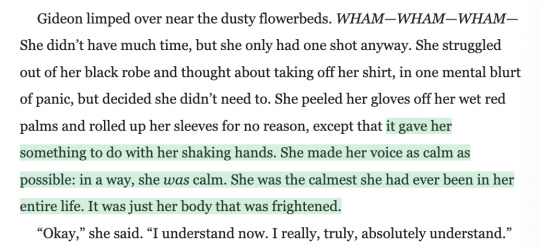







live for her / die for her
(Gideon the Ninth, Harrow the Ninth, Nona the Ninth)
#god. i am so normal about this.#i did a reread and took notes this time so im gonna be posting things i found from that !! this is just a little parallel#but i have WAY more i have a 24 page google doc. because i have autism#the locked tomb#tlt#tlt series#tlt meta#tlt analysis#gideon the ninth#harrow the ninth#nona the ninth#gtn#htn#ntn#griddlehark#gideon nav#harrowhark nonagesimus#palamedes sextus#harrow#harrowhark#junos silly little locked tomb thoughts
1K notes
·
View notes
Text
Why am I only now finding out that a TRIDENTARIUS is a sea snail and THIS is what it looks like???

Etymologically, Tridentarius dentatus means "toothy trident" but trident on itself means three teeth so the snail is named basically "toothy three-tooth"
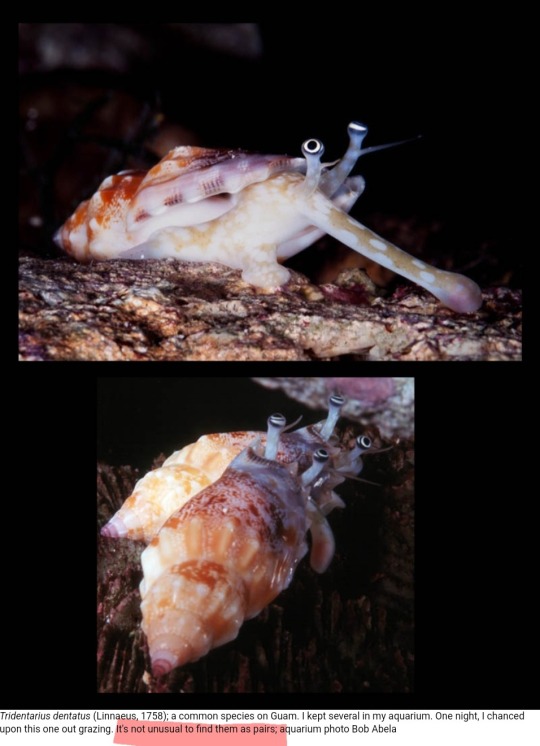
"It’s not unusual to find them as pairs"
Oh really. I never would have guessed.
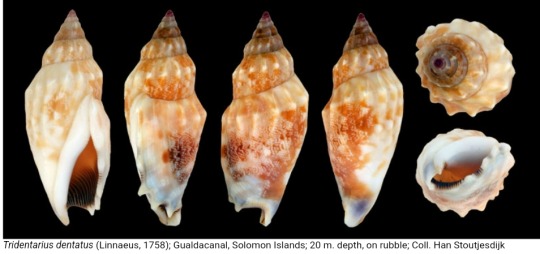
Feeling really stupid rn, all this time I thought Ianthe and Corona were named for a trident 🔱 , not a conch.
#tlt#the locked tomb#gideon the ninth#harrow the ninth#nona the ninth#ianthe tridentarius#coronabeth tridentarius#the tridentarii#name meanings#tlt meta#tlt analysis#sea snail#tridentarius dentatus#my post
773 notes
·
View notes
Text
so fucking funny to me when people talk about tlt setting like everyone in the whole society is sorted into being either a necromancer or a cavalier. like yes necromancy is an inborn trait. but cavalier? that's a wholeass job. that's a career. assigned butler at birth
#the locked tomb#to be clear this isn't vagueing aboht anyone's analysis essays or anything#this is about a kidfic that assigned necrocav roles to all the children#not even as pairs#just like. this baby is a necromancer and this baby is a cavalier#I think sometimes. we get so caught up in the gender analysis of it all we whiff on the class dynamic
815 notes
·
View notes
Text
I hope I’m getting an A in TLT analysis
In Nona the Ninth, the Angel talks about the message, and the Angel’s name is AIM, her predecessor was Emma Sen (MSN), which are both probably related to the MSN and AIM messaging systems, right?
Well, I’ve been thinking about it, and about the tower, and here’s what I’ve got.
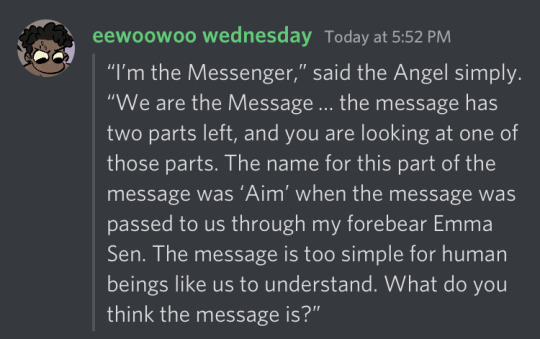
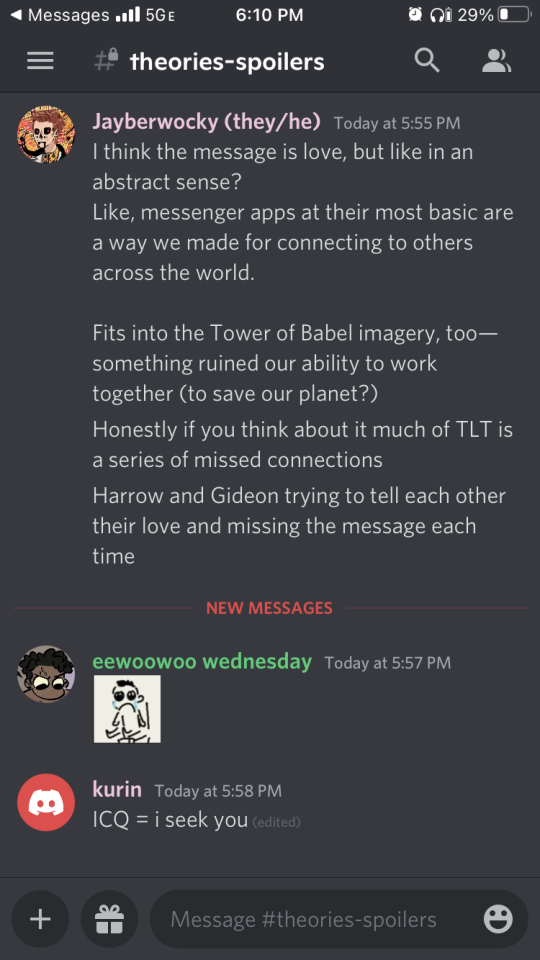
Transcript:
“I’m the Messenger,” said the Angel simply. “We are the Message … the message has two parts left, and you are looking at one of those parts. The name for this part of the message was ‘Aim’ when the message was passed to us through my forebear Emma Sen. The message is too simple for human beings like us to understand. What do you think the message is?”
I think the message is love, but like in an abstract sense?
Like, messenger apps at their most basic are a way we made for connecting to others across the world.
Fits into the Tower of Babel imagery, too, with the tower in the river— something ruined our ability to work together (to save our planet?)
Honestly if you think about it much of TLT is a series of missed connections:
Harrow and Gideon trying to tell each other their love and missing the message each time
#alecto the first#alecto speculation#tlt#the locked tomb#locked tomb analysis#nona the ninth speculation#nona the ninth spoilers#Nona the ninth
31 notes
·
View notes
Text
do you ever think about how at the end of Nona the ninth, Alecto doesn't really know how to kiss properly and ends up hurting Harrow in the process? but when she was Nona in Harrow'd body she knew what to do to kiss The Prince? do you think about Harrow's body knowing exactly how to kiss Gideon's body? because i think about it an awful lot
#foggy thoughts#the locked tomb#nona the ninth#the locked tomb analysis#griddlehark#gideon the ninth#tlt#alecto the ninth
835 notes
·
View notes
Text
ianthe is very careful not to compromise her advantages and most of all she's careful not to compromise her Self. she loooves to play with her food but to actually choke it down means it might become a part of her. btw this is why she flirted w harrow the whole way thru but steered clear when it came to actually giving harrow any meaningful vulnerability or comfort
930 notes
·
View notes
Text
i'm still emotional about the stupid bit from GtN where harrow leaves gideon some bread in drawer for when she wakes up after the avulsion lab, because like. harrow gets overwhelmed by tea and biscuits, the idea of eating for pleasure is entirely alien to her, but she understands it's something gideon might appreciate so she makes her best effort, she's really trying to understand her
we see it from gideon's perspective as another baffling harrow moment, but from harrow's perspective, what a touching gesture? when harrow asks gideon what she has to do to earn her trust and gideon asks to get some sleep, she clearly takes to heart that she'd not been conscious of gideon's needs
when gideon is recovering, harrow, believing her house is at stake, can't afford to waste time waiting for her, but nonetheless before leaving takes the time to make an attempt to make gideon feel cared for, even though she doesn't really know how. just like the sword in HtN, harrow has no idea how to properly take care of gideon or express her love but she tries in her own little autistic bone gremlin way and i think it's really sweet
#tlt#the locked tomb#harrowhark nonagesimus#gideon the ninth#gideon nav#griddlehark#harrow the ninth#nona the ninth#tlt analysis
4K notes
·
View notes
Text
hi locked tomb fandom !!
i made an analysis document that compile important informations about the series, comments on every single chapter of every book, theories, biblical and classical parallels, name meanings (not limited to those in the prononciation guides, and linked to character theories), and other things. i spent a very long time on it and it’s still in progress, but i think it’s long enough to be shared now, since it’s over 100 pages.
please tell me if you have ideas of things to add, any theory you’d like to share, anything you think might be relevant. and please share this, writing it really helped me understanding and connecting things better, so i think it could be useful for others
#the locked tomb#tlt#tlt meta#tlt analysis#the locked tomb analysis#tlt series#tlt spoilers#nona tlt#tlt thoughts#alecto tlt#christianity in tlt#tlt names#tlt theories#the locked tomb theories#gideon the ninth#gtn spoilers#harrow the ninth#htn spoilers#nona the ninth#ntn#ntn spoilers#ntn theories#alecto the ninth#atn speculation#atn theories
820 notes
·
View notes